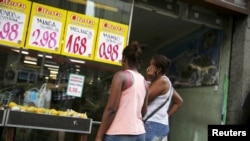Brazil's economy contracted sharply in 2015 as businesses slashed investment plans and laid off more than 1.5 million workers, official data showed on Thursday, setting the stage for what could be the country's
deepest recession on record.
Gross domestic product (GDP) shrank 3.8 percent last year, capped by another steep contraction in the fourth quarter, according to Brazilian statistics agency IBGE. It was the worst performance of any G20 nation in 2015.
It was also Brazil's largest annual contraction since 1990, when the country was struggling with hyperinflation and a debt default. The outlook for 2016 is nearly as bad, with a central bank survey forecasting a 3.45 percent contraction.
Back-to-back annual drops of that magnitude would amount to the longest and deepest downturn since Brazil began keeping records in 1901.
Brazil is "replicating the lost decade of the '80s in just two years," Goldman Sachs economist Alberto Ramos said in a research report. He added that the economy was close to an outright depression given that its contraction began nearly two years ago.
A paralyzing political crisis, rising inflation and interest rates and a sharp drop in prices of key commodity exports have formed a toxic cocktail for Latin America's largest economy. The disastrous burst of a major mining dam and the biggest oil strike in 20 years added further strain in 2015.
Last year's contraction matched market expectations in a Reuters poll. Yields on interest rate futures rose after the data was published, also reflecting a split central bank decision to leave interest rates unchanged on Wednesday.
Stocks on the Sao Paulo exchange gained, as did the country's currency, the real.
Brazil's government said the poor data had been expected and added that it was focused on boosting the economy this year. "We want 2016 to be a year of recovery for jobs, employment, income, with economic growth," Labor Minister Miguel Rossetto said.
However, a private survey on Thursday showed services activity in February fell at the steepest pace on record, suggesting the economy had yet to hit bottom.
"We will probably see a similar contraction this year. There are no growth engines yet. The only one could be exports. But Brazil's economy is relatively closed, so we don't see that taking us out of this hole," said Joao Pedro Ribeiro, Latin America economist with Nomura Securities.
Costly stimulus
Brazil, once the world's seventh-biggest economy, has been underperforming since 2011, the year leftist President Dilma Rousseff took office. A sharp increase in government spending and subsidized credit underpinned the labor market until 2014, at the cost of fueling inflation and eroding government
finances.
The recession took root just as Rousseff started to roll back the costly stimulus policies, hiking taxes and interest rates and slashing investments in oil production. A corruption scandal at state-run oil producer Petroleo Brasileiro SA
and major construction firms also froze work at many infrastructure projects across the country.
Rousseff's popularity plummeted to record lows last year, fueling street protests and calls for her impeachment.
"Despite all the rhetoric from Rousseff last year about boosting private investment, it's abundantly clear that investors, both foreign and domestic, are staying away in their droves," said Michael Henderson, lead economist with consulting firm Verisk Maplecroft in England.
The downturn has been so severe that Brazil's economy will probably only regain its previous size by 2019, as it grapples with a much larger debt load, according to a Reuters poll.
The IBGE data showed that Brazil's GDP contracted 1.4 percent in the fourth quarter from the third, which was its fourth straight quarterly decline. It was down 5.9 percent from the fourth quarter of 2014.
Agriculture was the only bright spot, with a fourth-quarter growth rate of 2.9 percent versus the third quarter. In the same period, Brazil's industry and services sector fell 1.4 percent each.
Household consumption declined for a fourth straight quarter, with a drop of 1.3 percent, while investments plunged 4.9 percent. Government consumption fell 2.9 percent, the steepest quarterly decline since the end of 2008.












